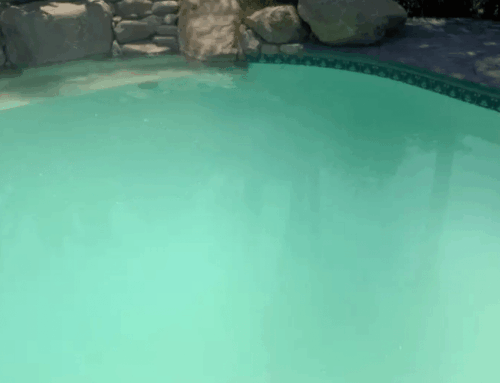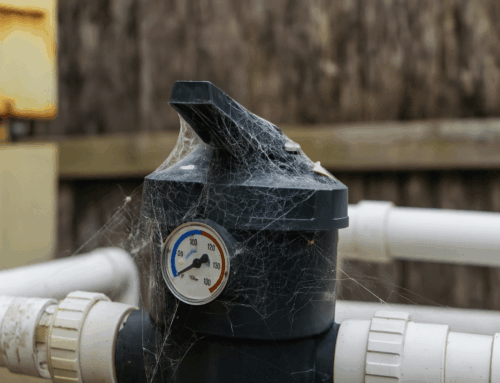
There’s nothing better than a cool Australian summer than enjoying your own backyard pool, you should service a residential pool weekly in summer and fortnightly in cooler months. Book a professional service at least quarterly and a full equipment inspection annually. Increase frequency after storms, heavy use, or when the water looks dull. This routine keeps chemistry stable, prevents algae, and avoids costly repairs.
What does pool servicing include?
A standard service checks pool water chemistry, cleans baskets and filters, inspects equipment, and confirms healthy water flow. The exact list varies by pool size and filter type, but these are core tasks.
Typical service tasks
- Test and balance pH, free chlorine, total alkalinity, calcium hardness, and cyanuric acid
- Empty skimmer basket and pump basket, remove leaf litter and other debris
- Brush pool walls, steps, and waterline, then vacuum the pool floor
- Check filter pressure and clean or backwash the filtration system
- Inspect the pool pump for leaks or noise, confirm seals and unions are tight
- Review timers, controllers, and salt chlorinator output, then verify water clarity
How often should you book a professional pool service?
Book a professional pool cleaning service monthly during the swimming season and at least quarterly in winter. Many pool owners choose a weekly service during peak summer to keep the pool crystal clear. A yearly equipment inspection catches wear early.
A reliable team follows a pro schedule that works.
- Weekly in summer: full clean, chemistry balance, filter check
- Fortnightly in spring and autumn: clean, balance, and set run time for changing weather
- Monthly in winter: chemistry check, light clean, equipment check, cover care
- Annual: deep inspection of pump, filter, heater, and salt cell, with preventive parts replaced as needed
Factors That Affect Service Frequency
Understanding the factors that influence how often your pool operates at its best will help you design the right maintenance schedule.
- Usage – More swimmers mean more sunscreen, body oils, and debris entering the pool water, which can affect pH levels and chlorine levels.
- Weather Conditions – Hot, sunny days encourage algae growth, while storms can blow in dirt, leaves, and other debris.
- Surrounding Environment – Trees and gardens near the pool increase the amount of organic matter in the water, impacting water quality.
- Type of Pool – Commercial pools often require more frequent servicing than residential pools due to higher swimmer loads.
- Filtration System – The size, age, and efficiency of your filtration system play a big role in how often the pool needs servicing.
Weekly Pool Service Checklist
Weekly tasks are essential to keeping your pool in top shape during the swimming season. These tasks will help you maintain a healthy, safe pool environment.
- Check and Adjust Water Level
Ensure the water level is neither too high nor too low for the pumps and filtration system to operate efficiently. - Remove Debris
Use a skimmer to clear the surface and remove debris such as leaves, insects, and dirt. Empty skimmer baskets to maintain water flow. - Brush Walls and Tiles
Brush walls and scrub tiles to prevent algae growth and staining. - Test pH Levels and Chlorine Levels
Balancing chemicals is critical. The correct pH levels and chlorine levels keep the water clean and safe. - Backwash the Pool Filter
Reverse water flow to clean out dirt and contaminants from filters. - Inspect Pumps and Equipment
Ensure all equipment is in good working order and there are no leaks or unusual noises. Emptying skimmer baskets is an important weekly task to maintain water flow and prevent blockages.
Monthly Pool Maintenance Tasks
In addition to weekly maintenance, monthly service ensures deeper cleaning and longer lasting equipment.
- Clean the Filter Thoroughly – Remove built up dirt and oils from filters to improve water flow.
- Apply Algae Preventative – Prevents algae growth and keeps pool water clear.
- Test Calcium Hardness – Proper levels protect the pool walls, tiles, and equipment from scaling or corrosion.
- Inspect Safety Equipment – Check diving boards, ladders, and handrails for wear and tear. Seasonal tasks include checking and maintaining safety equipment such as ladders and diving boards to ensure they remain safe and functional.
- Check Pool Lights – Ensure swimming pool lights are working and watertight.
- Examine the Filtration System – Look for worn seals or cracks in the housing.
Seasonal Pool Care
Different times of year call for specific seasonal tasks.
- Summer – Heavy use means weekly maintenance is essential. Brush walls more often, keep chlorine levels stable, and remove debris daily if needed.
- Autumn – Falling leaves can clog skimmer baskets and filters, so clean more frequently.
- Winter – Even if you do not swim, a pool still requires attention. Reduce pump run time, balance chemicals, and cover the pool to minimise dirt and water loss. Neglecting winter pool maintenance can lead to larger issues later on, such as algae growth or equipment damage.
- Spring – Prepare for the swimming season by testing all equipment, balancing chemicals, and giving the pool a thorough clean.
Signs Your Pool Needs Immediate Servicing
Sometimes you cannot wait until the next scheduled service. Book a professional pool cleaning immediately if you notice:
- Cloudy water that does not clear after chemical adjustment
- Persistent algae growth
- Unusual smells from the water
- Bubbles or reduced water flow from returns
- Leaks around pumps or other equipment
- Damaged or loose tiles
- Malfunctioning safety equipment
DIY Pool Care vs Professional Pool Service
Many pool owners handle weekly tasks themselves, but there are clear benefits to hiring a local pool professional.
DIY Advantages
- Saves money in the short term
- Flexible scheduling
- Good for light maintenance such as debris removal and chemical adjustment
Professional Service Advantages
- Expert advice and knowledge of proper maintenance techniques
- Specialised equipment for thorough cleaning
- Ability to spot issues before they become costly repairs
- Convenience, especially for those with busy schedules
- Year round maintenance plans for both residential and commercial pools
If you are unsure about water quality, chemical balancing, or equipment maintenance, your local pool shop can provide expert advice or recommend a professional service.
Typical Costs of Pool Servicing in Australia
Pool servicing costs vary depending on pool size, location, and the level of service. As a guide:
- Casual Visit – From $65 to $120 for basic cleaning and chemical adjustment
- Regular Maintenance Plan – From $100 to $200 per month for weekly or fortnightly visits
- Commercial Pool Contracts – Higher rates due to increased compliance and frequent maintenance requirements
Investing in regular maintenance will save money in the long run by avoiding major repairs and extending the life of your pool equipment.
Bottom line
A consistent maintenance schedule keeps your swimming pool safe and clear with fewer emergencies. Aim for weekly attention in the swimming season, adjust to fortnightly or monthly as weather cools, and book a professional at least quarterly with a full annual check. Regular servicing protects the filtration system, the pool pump, and the pool filter, holds chemistry steady, and saves money by preventing problems from taking hold.
If you want your pool to remain healthy, beautiful, and safe for your family or guests, regular pool maintenance should be a priority. By keeping the water clean, removing debris, and regularly servicing your equipment, you will have worry free swimming for years to come.

With over 20 years of industry experience, Adrian Mole is the founder of 1 Pool Care, a leading mobile pool service in Perth. Known for his expert knowledge and reliable service, Adrian delivers professional pool cleaning, equipment repairs, and water balancing across the metro area. Backed by SPASA accreditation, he’s committed to quality, convenience, and customer satisfaction.











Social Media